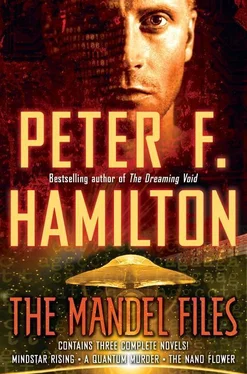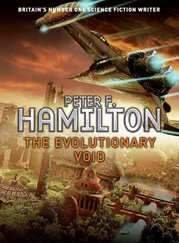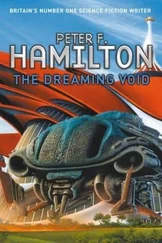Julia heard a metallic scrape behind her, and turned in the chair. The manor staff were supposed to leave her alone when she was in here. But it was her father, Dillan, who was opening the library door.
She watched the wrecked man move dazedly into the room, hating herself for the pain she felt at the sight of him. He was wearing jeans and a bright yellow sweatshirt, with elasticated plimsolls on his feet. At least he’d remembered to shave, or someone had reminded him. There were a couple of male nurses on permanent call at the manor, for when he got difficult, and when he had nightmares. He wasn’t much trouble, not physically, spending most of his days in a small brick-walled garden that backed on to the kitchen wing. There was a bench by the fishpond for him when the weather was fine, and a Victorian summerhouse for when it rained. He would read poetry for hours, or tend to the densely packed flower borders, throw crumbs to the goldfish.
And that was it, she thought, holding her face into that well-practised expressionless mask. All he was capable of, reading and weeding. The nurses gave him three shots of syntho a day.
If we were poor, she thought, they’d lock us all away as crazy, the whole Evans family, all three of us, three generations. A dying man with grandiose aspirations for the future, a syntho addict, and a girl with an extra brain who can’t make friends with anybody. We probably deserve it.
Dillan Evans smiled as he caught sight of his daughter. “Julie, there you are.”
She rose smoothly from the admiral’s chair, switching off the flatscreen and its images of treachery. Her father walked towards her, taking his time over each step. He was trying to hide a bunch of flowers behind his back.
She couldn’t despise him, all she ever felt was a kind of bewilderment mingling with heartbreaking shame. For all his total syntho dependency, she was his one focal point on the outside world, his last grip on reality. He’d come with her to Europe, not caring about the location, not even caring about having to live in the same house as his father again, just so long as he was with her. Even the First Salvation Church had been glad to get him off their hands, and they recruited new bodies with the fervour of medieval navies.
“For you,” Dillan Evans said, and produced the flowers. They were fist-sized carnations-mauve, scarlet, and salmon pink.
Julia smelt them carefully, enjoying the fresh scent. Then she kissed him gently on the cheek. “Thank you, Daddy. I’ll put them in a vase on the table, here look, so I can see them while I’m working.”
“Oh, Julie, you shouldn’t be working, not you, not when it’s a bright sunny day. Don’t get yourself tangled up in the old bastard’s schemes. They’ll leach the life out of you. Dry dusty creatures, they are. There’s no life in what he pursues, Julie. Only suffering.”
“Hush,” she said, and took his hand. “Have you had lunch yet?”
Dillan Evans blinked, concentrating hard. “I don’t remember. Oh, God, Julie, I don’t remember.” His eyes began to water.
“It’s all right,” she said quickly. “It’s all right, Daddy, really it is. I’m going to have my lunch in a little while. You can sit with me.”
“I can?” His smile returned.
“Yah, I’d like you to.” She held the flowers up. “Did you grow these?”
“Yes. Yes I did, up from tiny seeds. Like you, Julie, I grew you, too. My very own snowflower. The one stem of beauty in the frozen wilderness of my life.”
She put her arm in his, and steered him towards the library door.
“I was looking for your friend,” Dillan Evans said. “The pretty one. I had some flowers for her as well.” He began to look around, his face tragic.
“Katerina?”
“Was that her name? She had hair that shone so bright in the sun. I showed her round my garden. And we talked and talked. There’s so few do that. Did you know she can charm butterflies on to her finger?”
Julia winced at the thought of Kats talking to her father. Had Adrian been there as well?
She closed the library door behind her, blocking out the worries of the present. But only so she could suffer in a different way, she thought bleakly. Typical.
“Like an angel,” her father said in a wistful tone. “Radiant and golden.”
Greg had never been in an airship before. In fact the last time he’d been airborne in anything other than the ghost wing was in the Northern European Alliance’s retreat from Turkey. The experience had left him with unsavoury memories of air travel.
As with all retreats it was chaos bordering on utter shambles. Only the RAF emerged with any credit, commandeering anything with wings that didn’t flap in one last ballbusting effort to get the squaddies out before the fall of eternal night. Greg wound up jammed between two bloodsoaked medevac cases in a severely overloaded Antonov-74M, watching pinpoint nova flares floating serenely through the air in a desperate bid to lure the Jihad legion’s Kukri missiles from the jet exhausts.
There was a universe of difference. The Alabama Spirit was a Lakehurst-class ship on the Atlantic run; a leviathan, first-class passengers had individual cabins, three lounges, their own dining room, a casino, and twenty-four-hour steward service.
He’d taken a Dornier tilt-fan shuttle up from Stanstead the previous evening, after he’d finished interviewing the furnace operators and the Zanthus managers. It had been dark when they embarked above the English channel, all he’d seen through the Dornier’s cabin window was an oval of darkness blotting out the wisps of pale moonlit cloud. The airship’s outer skin was one giant solar collector, providing electricity for the internal systems. Hydrogen-burning MHD generators powered a pair of large fans at the rear. He was looking forward to reaching Listoel in daylight and seeing the Alabama Spirit unmasked.
Morgan Walshaw had sent six security personnel along with him. Five hardliners, Bruce Parwez, Evan Hams, Jerry Masefield, Isabel Curtis, and Glen Ditchett to handle the arrests, they’d all had duty tours up at Zanthus before, knew how to handle themselves in free-fall. He’d checked them out, satisfied with what he’d found, tough, well-trained professionals. The staff lieutenant was Victor Tyo, a twenty-five-year-old Eurasian, who looked so fresh-faced he could’ve passed himself off as a teenager without much trouble. It was his third field assignment, first in an executive capacity, and he was determined to make it a success.
Greg watched the approach to Listoel from the gondola’s Pullman observation lounge, right up at the prow. Two kilometres below the lounge’s curving transparent walls the deep blue Atlantic rollers stretched away to merge with the sky at some indefinable distance. The ride was unbelievably smooth.
“Have you ever been up to Zanthus before?” he asked Victor Tyo.
“Yes, I went up last year. The company launched a new microgee module, a vaccine lab. I helped interface our security monitor programs with its supervisor gear. It’s my familiarity with the monitor programs which got me assigned to the case. Part of my brief is to upgrade them.”
“That and the fact you’ve been cleared yourself. I’m supposed to vet the security staff out at Listoel and Zanthus, too. Until then, they’re on the suspect list along with the furnace operators and managers.”
Victor Tyo shifted uncomfortably. “That’s some pretty powerful voodoo you’ve got there. Did you actually read my mind to clear me?”
“Relax, I can’t read minds direct. I sense moods readily enough, but that’s not quite good enough. For instance I can see guilt, but most people have something to be guilty about. Petty criminals are the worst for that-the bloke fiddling his lunch expenses, accepting payola. Simply because they are so petty it gnaws at them, becoming a dominant obsession.”
Читать дальше












